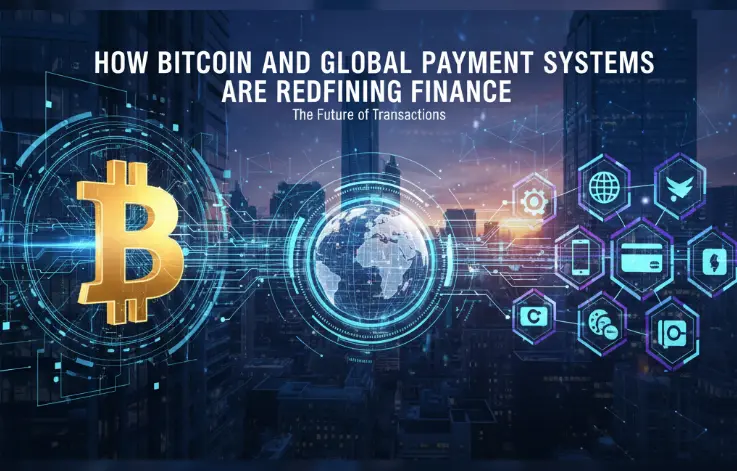
Implementing Bitcoin within the global payment system transforms international payments, providing more affordable and quicker options compared to current systems, which involve numerous intermediaries and have a slow transaction process. This article will discuss the potential and pitfalls of Bitcoin’s international payments strategy, examining efficiency gains, regulatory risk, volatility, and the changing trends of its adoption worldwide.
With global interconnectedness expanding, there has never been a higher need for efficient cross-border payment platforms. Intermediated systems have been hindered by delays and overcharging, often requiring multiple banks and service providers to guarantee the completion of a single transaction. Bitcoin, in its decentralized form, is really a viable alternative, offering a means for direct peer-to-peer transfers worldwide.
The bitcoin price is around $115,291.00 per BTC, a testament to its continued utility in the field, while its underlying blockchain technology continues to capture interest from financial institutions, payment providers, and regulatory bodies in pursuit of speedier and more transparent global transaction solutions.
The Cross-Border Payment Legacy Environment
For instance, the classical cross-border payment infrastructure, SWIFT, has been used in international payments over the past few decades. The infrastructures, however, are typically a series of intermediaries, such as correspondent banks, clearing centers and settlement providers, which increase transactional costs and delay processing time.
The mean fee of international wire transfers, as Binance data reflect, lies in the range of $25 and $50 and such payments take up to five business days to process. These inefficiencies increase the delay in transferring funds and cause unpredictability for businesses and individuals who rely on settling payments quickly.
Additionally, the transparency of the fee structure and non-equivalent exchange rates contribute to the complications of international transactions. All these cumulative forces create a pressing need for a more rapid, secure, and less expensive alternative in the global payment system, allowing blockchain-based currencies, such as Bitcoin, to fill the infrastructure gaps and facilitate cross-border money flow without difficulty.
Bitcoin’s Role in Revolutionizing Payments
Being a decentralized digital currency, Bitcoin possesses many benefits over conventional payment systems. It can be used 7 days a week, 24 hours a day, without the use of any middlemen, and with less time. Users can save their money from paying fees to intermediares and have full transparency over counterparties in transactions. Binance Research notes that Bitcoin’s mean fee is lower than that of traditional systems, although it varies depending on network congestion.
In addition, Bitcoin offers transparency and security through its immutable blockchain, reducing fraud risk and fostering greater trust in the payment process. In most cases, payment will take around 10 minutes. However, during busy periods, confirmations may be slower and prices may be higher.
Apart from the longer payment time hurdle, the efficiencies give Bitcoin a potential alternative status for cross-border payments, particularly for business and individual participants who require faster, more predictable, and safer international money transfers.
Increasing Financial Inclusion Via Bitcoin
In most nations, there are few opportunities to use conventional banking infrastructure and millions are prevented from full participation in the global economy. Bitcoin presents the people in underserved groups with a firsthand pathway to utilizing financial services without middlemen. As smartphones and internet use expand, senders and recipients can send payments anywhere, regardless of whether they have a bank account.
By 2024, more than half a million women users had made over $4 billion in domestic and international cross-border crypto remittances, which shows that cryptocurrency facilitates financial inclusion and empowers underserved populations worldwide. Besides remittance, small businesses and individuals can leverage the opportunities of Bitcoin by taking advantage of global trade, receiving payments in milliseconds, storing funds in Bitcoin, and avoiding local currency volatility.
According to Binance’s Chief Executive Officer, Richard Teng, “Our new Shariah Earn product offers halal-compliant earning opportunities, empowering the global Muslim community to participate in crypto confidently.” These developments suggest that digital currencies, such as Bitcoin, are not only financial instruments but also tools for socioeconomic empowerment, unlocking avenues toward wealth creation, knowledge, and broader economic participation in previously excluded communities.
Challenges in Implementing Bitcoin in International Settlements
Although it has advantages, Bitcoin’s usage in cross-border payments also faces challenges. Firstly, price volatility is a concern; Bitcoin’s prices are susceptible to severe swings over very short periods, which can impact the value of payments.
In addition, regulatory confusion in various jurisdictions is a stumbling block to wide-ranging usage. While a handful of nations have adopted cryptocurrency, a few have imposed draconian regulatory controls, resulting in a patchwork of global standards for Bitcoin payments. Local law consciousness and compliance controls remain essential to international usage.
Bitcoin in Cross-Border Transactions
Several real-life case histories demonstrate the value of Bitcoin in cross-border payments. In 2024, a remittance company reduced fees by 30% when it transitioned from employing regular banking channels to Bitcoin-driven remittances. An e-commerce company in Southeast Asia adopted Bitcoin payments and its overseas sales have increased 25% due to fee savings and faster clearance. These case histories reflect Bitcoin’s practical applications in cross-border payments. For broader e-commerce contexts, integrating a robust system like an NMI payment gateway can similarly optimize transaction routing and reduce administrative overhead.
Beyond these examples, Bitcoin has enabled small businesses and individuals in areas with limited access to mainstream banking infrastructure to engage in international trade. Small Latin American and African exporters have cited streamlined payment protocols and more dependable cash flows as benefits of accepting payments in Bitcoin from remote payers.
As Binance documents, cross-border Bitcoin payments settle in a few minutes, compared to days, via traditional banking infrastructure and costs are reduced and transparent. Moreover, the decentralized structure of Bitcoin also avoids dependence on third parties, decreases the risk of volatility due to fluctuations in the exchange rate value, and offers an impermanent bank of accountability and trust between distant parties. These advantages demonstrate Bitcoin’s potential as a scalable and inclusive solution for global business and finance.
The Role of Stablecoins in Capping Volatility
Binance Research summarizes how stablecoins enable fast and inexpensive cross-border payments, reconciling the blockchain’s speed with traditional currency stability. Stablecoins allow parties, such as companies and individuals, to transact without fear of sudden value fluctuations, which could disrupt cash flow or international trade payable settlements.
Stablecoins have been most helpful in economically turbulent areas. Stablecoins provide a stable means of receiving and sending payments, protecting against local currency devaluations or hyperinflation. Stablecoins also facilitate financial inclusion, enabling participation in global commerce despite limited banking infrastructure availability. Their transparent and auditable nature also introduces security and trust to cross-border payments.
Moreover, stablecoins may also be utilized in decentralized finance (DeFi) applications, which offer new lending, borrowing, and payment possibilities beyond borders. With stability, speed, and accessibility, stablecoins are increasingly a core component of modern cross-border payment ecosystems, alongside Bitcoin and other cryptocurrencies, in a way that offsets concerns about volatility hindering greater adoption.
Integration and Development
The future of cross-border payments lies in integrating Bitcoin, blockchain, and traditional financial infrastructure. Central bank digital currencies and accelerated blockchain scaling are building an internationally quicker, safer, and faster payments system. Blockchain technology’s key features combined with financial networks’ regulatory control and reliability can allow stakeholders to create a hybrid ecosystem that fulfils innovation and compliance requirements.
Through Binance Research, collaborations between incumbent financial players and digital currency platforms are on the rise, indicating a more structured global payments infrastructure that encompasses all.
These linkages also allow interoperability among a few digital currencies and heritage payment platforms, reducing friction in cross-border transactions. Emerging technologies, such as Layer 2 protocols and payment channels, enhance transaction speed while lowering costs, making Bitcoin and other digital currencies more practical for daily international payments.
Moreover, collaboration between banks, fintech companies, and blockchain companies is propelling standardised protocols, boosting efficiency and reliability, and building confidence among users. With regulators and institutions increasingly reviewing such linkages, the possibility of a globally standardised, inclusive, and transparent payments ecosystem draws near, providing a foundation for wide-reaching, long-term adoption, and financial inclusion.
Embracing a New Era in Cross-Border Payments
The entry of Bitcoin as a tool for cross-border payments is a paradigm-shifting event in international finance. Despite challenges, the sustained evolution of Bitcoin and its associated technology, along with its adoption, point to an optimistic future for cross-border payments. With Bitcoin’s prices remaining a reflection of growing belief in digital currency, international constituencies view Bitcoin’s potential to enhance efficiency, reduce costs, and promote financial inclusivity in cross-border payments as a viable possibility.
Besides reducing expenses and eliminating inefficiencies, Bitcoin and blockchain technology offer transparency and security that traditional payment mechanisms lack. Each payment is recorded indelibly, reducing the risk of fraud and enhancing auditability. Enterprises and small to medium-sized enterprises in emerging market countries can utilize Bitcoin to serve global clients without incurring the expenses of expensive intermediaries.
Ultimately, integrating digital wallets and payment platforms enables real-time settlement, allowing payments to flow freely across borders. With wider usage, Bitcoin fosters innovation in complementing technologies such as stablecoins, smart contracts, and decentralized finance, which boost the reliability, accessibility and inclusiveness of cross-border payments. Each of these changes, in its own right, points toward a faster, safer, and globally interconnected cross-border payment system.




